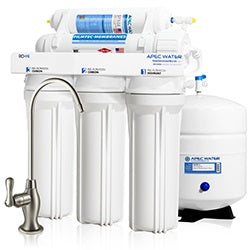For most people, their drinking water is regulated by federal and state governments since they receive their water through community supplies. However, about 15% of Americans have their own source of water, through private wells or springs on their property. The government does not regulate these water sources, and therefore, homeowners need to pay closer attention to the safety of their drinking water.
Most groundwater is dubbed safe, but people should have it tested periodically. Groundwater that fills wells can sometimes become contaminated, although the deeper the well, the less likely it is to be ridden with bad things. Some elements it picks up from rocks. But run-off pollutants can also seep into groundwater. Things like microorganisms, heavy metals, lead, copper, household waste, fluoride, and more can all be found in traces in groundwater.
The Safe Drinking Water Act of 1974 does not include private wells. However, looking at the requirements for that on the EPA website can give well-owners an idea of what the acceptable levels are for these many contaminants. Local health departments are also very helpful in providing information and assistance with well testing. Even some local colleges with environmental science programs can sometimes aid in testing water quality.
Risk of contamination depends on many things, such as how well your well was built, where it is located, and how well you maintain it. It also depends on your local environment, which includes the quality of the aquifer from which water is drawn and the human activities going on in the area near the well. An example could be being near farm animals, industries, etc.
It is important to test your well for pesticides, heavy metals, and organic chemicals before you use the water for the first time. Also, annual tests for nitrate and coliform bacteria should be done annually, especially in areas without sewers. If you use a private laboratory to conduct the testing, nitrate and bacteria samples will typically cost between $10 and $20 to complete. Testing for other contaminants will be more expensive, such as testing for pesticides or organic chemicals-- they can cost from several hundred to several thousand dollars.
In short, we do not recommend drinking water directly from your wells without any filtration/ protection, due to industrial contamination nowadays. We highly recommend that homeowners test their well water annually- make sure you've got safe drinking water, before consumption. After all, you OWN your well. So, you have the chance to always know what is in your water and can control the safety- without having to wait for a private company to tell you too late the water has a bug! Test annually and when you think there could be a problem. Otherwise, drink away.
Of course, it never hurts to play it safe and give yourself extra piece of mind by installing a filter in your home system.
According to recent news and reports, most tap and well water in the U.S. are not safe for drinking due to heavy industrial and environmental pollution. Toxic bacteria, chemicals, and heavy metals routinely penetrate and pollute our natural water sources making people sick while exposing them to long-term health consequences such as liver damage, cancer, and other serious conditions. We have reached the point where all sources of our drinking water, including municipal water systems, wells, lakes, rivers, and even glaciers, contain some level of contamination. Even some brands of bottled water have been found to contain high levels of contaminants in addition to plastic chemicals leaching from the bottle.
A good water filtration system installed in your home is the only way to proactively monitor and ensure the quality and safety of your drinking water. Reverse osmosis water purification systems can remove 90-99% of all contaminants from the city and well water to deliver healthy drinking water for you and your family.

Healthy and Convenient! Our Featured Reverse Osmosis Drinking Water System



